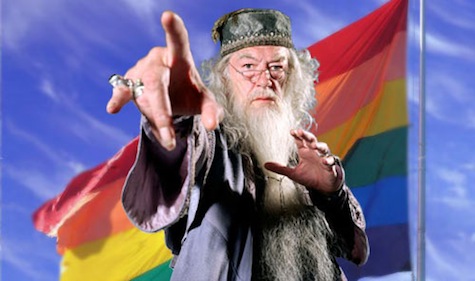The Harry Potter series has been banned for many reasons in its still-very-young life, most of them having to do with—gasp—witchcraft! And most of us rightly understand how silly that is. (Although, acknowledging this upcoming BBC reality show about teenaged exorcists, it looks as though a few people still haven’t cottoned on.) I remember the books published in its wake, though, for all the fretting parents. Not the unofficial guides or theory books, but the ones with titles something like “How to Teach the Christian Lessons in Harry Potter to Your Children.”
I always figured, hey—whatever gets those kids reading about wizardry is fine by me.
But magic spells cast by preteens were meant to be the least of everyone’s worries, according to more vitriolic parties. There were some groups that insisted that Harry and friends were promoting fearful lifestyles. I recall a prominent article to that effect claiming one of Harry’s good friends was obviously gay. The “obviously gay friend” was never named, which always left me deeply curious about who was being implicated. Was Ron getting too comfy in that shared dorm room? Was Hermione’s competence being read as “she don’t need no man, so she’s clearly into ladies”? Were they thinking Neville? Seamus? …Hagrid? The same piece insisted that homosexual imagery was transparent in the series by observing the sport of choice and the equipment needed for it.
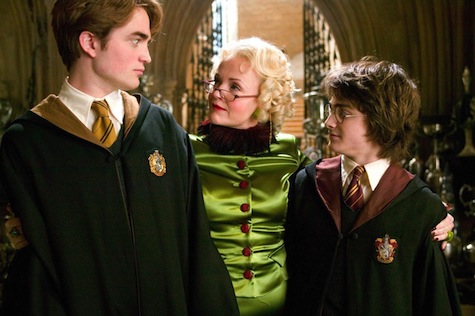
Phallic broomsticks aside, it is interesting to remember that when Harry Potter first hit shelves, this accusation was liable to upset even more folk than it might today. We live in a post-DOMA world now, and while some people are still not necessarily for gay marriage, they’ve at least heard of one. Gay characters in media have a higher visibility than they did even in the late 90s, when Harry rode the Hogwarts Express straight into homes all around the globe. They are in sitcoms, genre shows—they’re on Glee! Young people everywhere are exposed to the idea of gay families and gay students and the fact that Will & Grace was a thing once. But less than two decades ago, those examples were in shorter supply mainstream-wise. Suggesting that an insanely popular book series for children should have homosexual characters wandering around willy-nilly? That was right out.
And then something very interesting happened. A few months after The Deathly Hallows was released, J.K. Rowling responded to a fan at a reading event who asked whether or not Headmaster Albus Dumbledore had ever been in love. And the answer Rowing gave was that Albus Dumbledore was gay. That he had fallen in love with Gellert Grindelwald many years before the events of the books. Carnegie Hall erupted in applause.
The reason for the supportive outburst wasn’t hard to discern. Many fans had been asking for years—where was the LGBTQ population of the wizarding world? Recent studies are claiming (emphasis on claiming) now that one out of every ten people is gay, so chances are someone on the Quidditch team wasn’t being honest about who they wanted to ask to the Yule Ball. Finding out that one of the most powerful wizards on the planet, a leader and guiding force for the next generation of magic-users, was a gay man meant a new brand of visibility in the fandom.
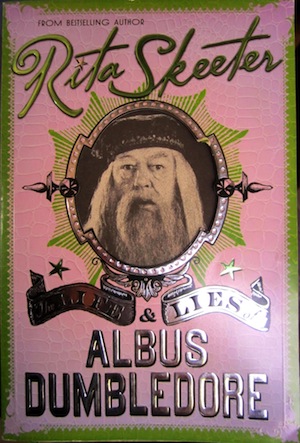
Unsurprisingly, it lead to a new wave of banning as well. Christian writer Berit Kjos claimed it was vindicating for the fundamentalist sect:
“My first response was, ‘Thank you, Lord,’ because this helps us show others that these books should not be used in the churches to illustrate Christianity. Because Dumbledore has been revealed as a homosexual, it helps me communicate my message.”
If witchcraft and questionable broomsticks couldn’t do the trick, surely the presence of a gay person in a vitally important role would—Rowling could not be writing these books with God in mind, according to these groups. There were others who claimed the opposite, that Dumbledore’s personal problems were actually helping to teach a Christian message against homosexuality—after all, Albus’ feelings for Grindelwald brought him nothing but pain at the hands of the man he loved, making him forget his family and leading to the loss of his sister. Still, it’s perfectly safe to brush off that theory: Rowling’s characters are all consummately flawed, beautifully human in their mistakes—she certainly didn’t intend that sort of message, and has been outspokenly supportive of Dumbledore when anyone has called his orientation into question.
But for all the celebration, there have been just as many dissenters in the LGBTQA community since 2007’s announcement. The questions being asked of Rowling are sound ones: Why did she wait so long to tell us? Why was it never mentioned in the books at all? What kind of message does that send to fans and readers everywhere?
Some accused Rowling of making such an important decision after the fact, but we know that isn’t true from a script meeting for the films before the seventh book had been released: When screenwriter Steve Kloves gave Dumbledore a line that mentioned some lovely young woman from a time gone by, Rowling scribbled that Dumbledore most certainly wasn’t thinking of young women on the corner of her script and flashed it to Kloves. The line was immediately cut.
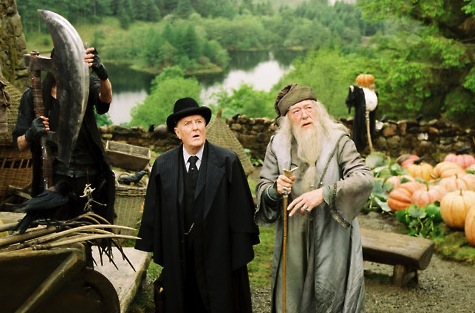
Some claimed it was a popularity tactic, leaving Dumbledore’s orientation out of the books, but making sure fans knew so Rowling could gain more goodwill. But to what purpose? The books were out, the series complete. When fans showed such an outpouring of support at the reveal, her response was, “If I’d known it would make you so happy, I would have announced it years ago!” This suggests that she was concerned about a fallout following the admission, and who could blame her? The Potter series had been under a critical eye from the beginning because of their young target audience. Religious attentions aside, Rowling frequently got mail from adult fans asking her to tone down the violence as the books continued because they were worried about frightening their kids. Every decision she made was questioned by well-meaning readers, particularly where the morality of the series was concerned. It’s possible she simply didn’t want so much attention on a single character while she was trying to get the story out into the world.
But those excuses become difficult to make in light of the pleas fans were making from the start. Many non-straight youths were asking the question over and over: Why isn’t there one kid at Hogwarts who’s like me? Even tangentially? Harry and his friends were known for their fierce acceptance of outcasted groups and people. Harry took “Loony Luna” to the Slug Club, Hermione fought for House Elf rights, the trio didn’t let wizarding prejudices about werewolves prevent them from listening to (and believing) Remus Lupin’s story about the Marauders and Sirius Black’s innocence. If one of the students at Hogwarts was concerned that they would be treated differently due to their sexual orientation, you can bet that the central characters of the books would have been first to show their support. In a series where the trials of growing up are so pointedly on display, wouldn’t that have been a welcome tale?
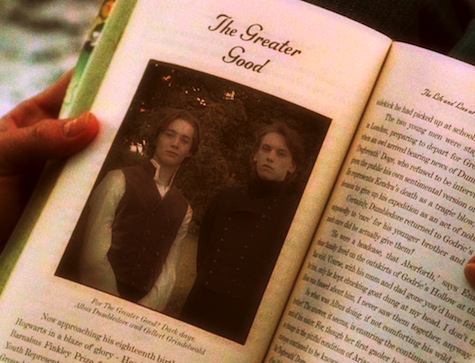
In addition, there are some who claim that by never stating Dumbledore’s preference outright in the books, you could easily decide that he is not gay. That Rowing’s intentions mean next to nothing if they were never canonized as text within the books. This opens up a whole other avenue of discussion revolving around author intention and what they present to their readers; there is so much information about the wizard world that we know Rowling has packed into crates of notes—but until fans know these details, they effectively don’t exist. And if they’re never assembled in a canonical place (such as the encyclopedia she has threatened to write so many times), some fans will never consider them official at all. Naturally, if Rowling makes it so, that will be good enough for most… but because a few consider the move illegitimate, it can hurt the fans who were personally affected for the better by learning Professor Dumbledore was a gay man.
Harry Potter is a massive tale, and if there’s one mark of the series, it’s that every fan has an opinion about every choice made in the books, no matter how minor. It makes Dumbledore’s coming out party a bittersweet affair. For my part, when it happened, I thought Rowling was a genius. It felt like she was flipping the proverbial bird to anyone who took issue with the idea because of how she chose to let the world know; she waited until the final book was out and had made its money, then turned around and went “Surprise!” And anyone who had a problem? The best they could do was throw their books out. Maybe throw a fit and delete everything they had ever contributed to the fandom (which did happen in a few memorable cases). But they couldn’t back out before completing the journey, which was sort of the point.
And then there’s the psychological effect known as “experience taking” to consider. Researchers have found that not clueing a reader into a character’s race or sexual orientation until the end of a story causes those readers to view said characters in a less stereotyped fashion, and relate to them better. It’s entirely possible that being uninformed about Albus Dumbledore’s orientation until they had experienced his entire character arc made for a more thoughtful readership. Perhaps in rereads of the series, the character might open up in entirely new directions with this new knowledge. That’s an exciting prospect for any fan.
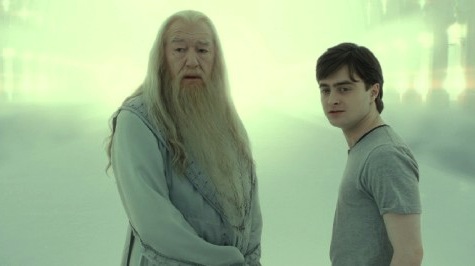
But none of this changes the fact that, when all is said and done, practically everyone wishes that J.K. Rowling had handled Dumbledore’s outing differently. And that in some cases, the Harry Potter series was banned for a fact about one of its characters that was never even mentioned within the books themselves. I’m not sure there is any other book or series that can claim the same. Perhaps it could have been handled differently. Perhaps that would have been better all around. But I can’t pretend I’m not thrilled that Albus Dumbledore has the ability to be another sort of inspiration for so many readers around the world. And when it comes right down to it, banning Harry Potter doesn’t make much of a difference when it’s still one of the most popular book series of all time. Or, as one equality campaign so succinctly put it:
Some Hogwarts Headmasters are gay. Get over it.
Banned Books Week 2013 is being celebrated from Sept. 22 to the 28; further information on Banned and Frequently Challenged Books is available from the American Library Association.
Emmet Asher-Perrin was one of those fans reading Dumbledore/Grindelwald slash fic before JKR admitted anything. It just made sense. You can bug her on Twitter and read more of her work here and elsewhere.










